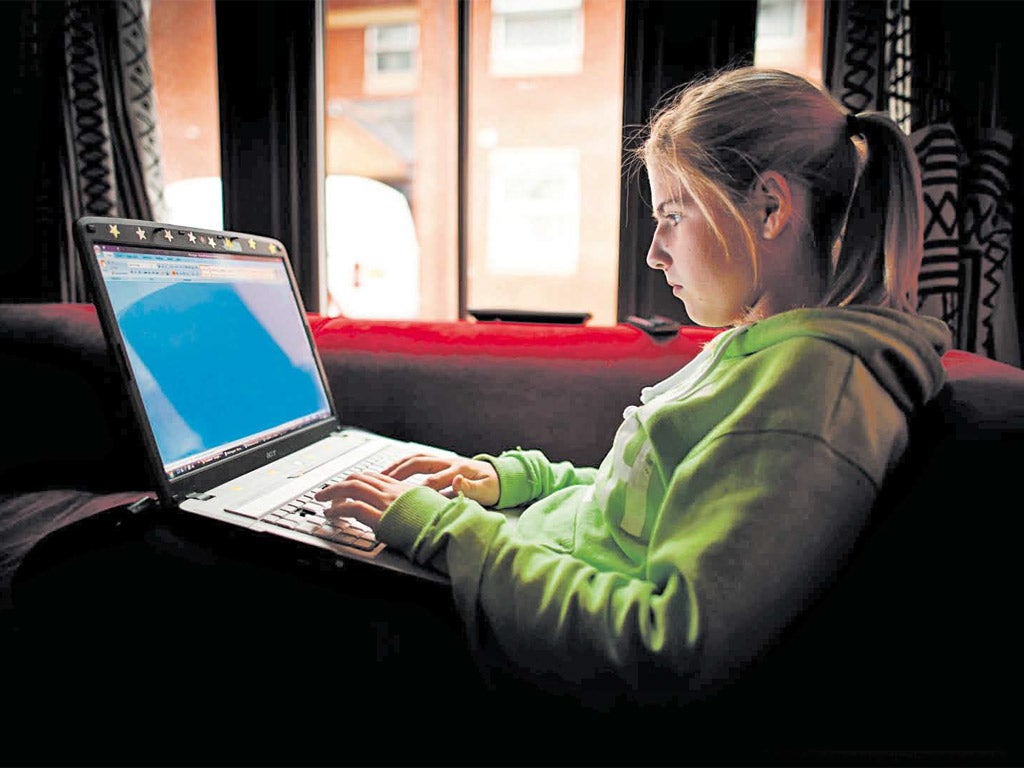Next generation of social media 'exposing girls to sexual abuse'
Increasingly popular 'question and answer' websites accused of exploiting children

Your support helps us to tell the story
From reproductive rights to climate change to Big Tech, The Independent is on the ground when the story is developing. Whether it's investigating the financials of Elon Musk's pro-Trump PAC or producing our latest documentary, 'The A Word', which shines a light on the American women fighting for reproductive rights, we know how important it is to parse out the facts from the messaging.
At such a critical moment in US history, we need reporters on the ground. Your donation allows us to keep sending journalists to speak to both sides of the story.
The Independent is trusted by Americans across the entire political spectrum. And unlike many other quality news outlets, we choose not to lock Americans out of our reporting and analysis with paywalls. We believe quality journalism should be available to everyone, paid for by those who can afford it.
Your support makes all the difference.A new breed of social media websites is leaving young people open to cyber bullying, with anonymous users able to bombard others with sexually explicit messages and demands.
Despite little mainstream media coverage, “question and answer” websites such as ask.fm, qooh.me and formspring.me have exploded in popularity. More than 29 million Formspring accounts have been created since its 2009 launch.
The sites allow users to sign up for a profile, with a name and photograph. Others can then ask questions completely anonymously, some open to all, some directed to a specific profile. Users choose which questions to answer, with the option to “like” answers, and in some cases, to share them on well known sites such as Facebook and Twitter. The anonymity provided by the sites has made them a hotbed for sexual pressure, bullying and abuse.
Browsing some of the sites for just a few minutes reveals a torrent of sexual demands, explicit questions and abusive threats to users whose photos suggest they are young teenage girls. Posts included: “You’re a fat, ugly, worthless piece of s***. Please kill yourself,” “Can we have sex?” and “Wanna do it dirty?”
One mother, aged 32, asked her 13-year-old daughter’s permission to let The Independent view her ask.fm profile, where other users, many claiming to be from her school, had posted a string of aggressively sexual questions: “Have you ever sucked a d***?”; “Do you shave your pubes?”; “Bra size?”; “Can I bang you?”
They call her “slut”, make sexual demands and threats and in one case, ask her to upload a video of “you cutting yourself”. The mother said: “Even in year five at a Catholic primary school, the emails she used to receive from the lads in her year were obscene and disturbing.”Her daughter was later diagnosed with anorexia and depression, took an overdose and spent 11 weeks in a mental health unit.
Elizabeth Muncey, a 27-year-old actor from London, contacted The Independent in shock after reading her 13-year-old sister’s text messages and Facebook page. She says: “I couldn’t believe the frequency with which she and her friends were being referred to as ‘sluts’, ‘whores’ and ‘slags’. The boys in her peer group also seemed to be behaving in aggressive and manipulative ways, coercing them to do things they didn’t want to.”
If they bowed to the pressure, they were then “shamed” for it. On the ask.fm site, her sister received countless abusive messages such as: “You dirty little year eight” and “whore”.
Many entries to the Everyday Sexism Project, which catalogues instances of sexism experienced by women on a day-to-day basis, refer to incidents of young people joking about rape and sexual violence without technology coming into play at all, such as the year 11 boy, aged 15 or 16, reported to have said “rape is a compliment really” in a classroom discussion. Nick Batley, 22, a volunteer sex educator with Sexpression, said this lack of understanding about consent and sexual violence is common among young people, both on and offline. While working with pupils aged 11 to 15, one told him: “Girls have a reputation to uphold… boys are meant to break that”.
Both Formspring and ask.fm did not respond to requests for comment. Vince Mabuza, the founder of qooh.me, said: “Cyber bullying is a huge problem on sites like qooh.me and the others. I have sleepless nights trying to come up with solutions to stop this . [But] shutting the site down won’t help, because new ones will be created and the cycle will repeat itself. What we have done is to give users some control by allowing them to disable the anonymous part of the site.”
Today, as part of the global One Billion Rising campaign to end violence against women and girls, the Government will debate making “personal, social and health education, including a zero tolerance approach to violence and abuse in relationships, a requirement in schools”.
Join our commenting forum
Join thought-provoking conversations, follow other Independent readers and see their replies
Comments